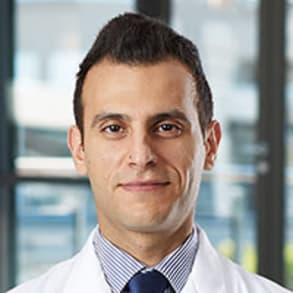[MUSIC PLAYING]
SPEAKER 1: The kidney disease pregnancy clinic at Ohio State University is a one-of-a-kind clinic that we just started this year. And it caters to the needs of patients with kidney disease that want to become pregnant or are pregnant, ones that have kidney disease that's discovered pre-pregnancy or during pregnancy. And the idea is to help those patients have a successful pregnancy with minimal complications to them and to the baby.
The best thing that we offer, I think, is individualized counseling. The rates of successful pregnancies and the complications with the pregnancy-- they vary according to the kidney disease. And they vary according to the degree of kidney disease.
Back in the day, most providers would tell patients that have some sort of kidney disease that is not a good idea to be pregnant. And that's not necessarily true. So patients with mild kidney dysfunction who have low-grade [INAUDIBLE] tend to do very, very well with pregnancy.
We do care for patients even that are on dialysis and patients with kidney transplant as well. And my experience where I trained for this is that actually, the outcomes of patient on dialysis are very, very similar to the patients who have a kidney transplant.
Sometimes we get some of those referrals during their pregnancy. Some diseases are discovered during pregnancy or just happen during pregnancy. And we do follow those patients throughout their pregnancy. We also do follow them after pregnancy because it's a good time to catch kidney diseases that a lot of patients are not aware of during pregnancy.
The idea of having a physical place is that patients are seen by the maternal and fetal medicine and the nephrologist at the same time. So a lot of our patients do travel quite a bit of distance to see those providers. And it's good to have the same message from different providers. So having this constant communication would make the care better and probably easier for the patients as well.
When we established this, we wanted to make it a multidisciplinary-type clinic. And then we have collaborators from the Department of Maternal and Fetal Medicine here at Ohio State.
I'd like to mention Dr. Heather Frey, who's my peer from the maternal and fetal medicine, and Dr. Steven Thung, who did help establish this with the nephrology department.
We're hoping that the kidney disease clinic at Ohio State University would continue to grow and cater for more patients, especially dialysis patients and transplant patients. We are hoping that the biospecimens that we get from those pregnant patients would help predict outcomes as opposed to wait until they happen.
